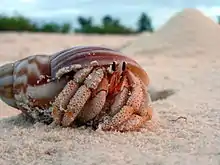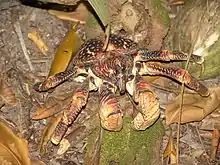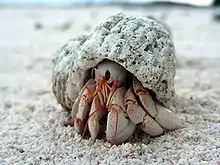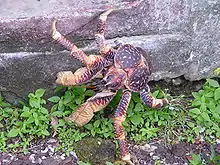Coenobitidae
The Coenobitidae are the family of terrestrial hermit crabs, widely known for their land-living habits. They are found in coastal tropical regions around the world and require access to the ocean to breed. The 17 species are placed in two genera:[1]
| Coenobitidae | |
|---|---|
 | |
| Coenobita perlatus | |
 | |
| Coconut crab, Birgus latro | |
| Scientific classification | |
| Kingdom: | Animalia |
| Phylum: | Arthropoda |
| Subphylum: | Crustacea |
| Class: | Malacostraca |
| Order: | Decapoda |
| Superfamily: | Paguroidea |
| Family: | Coenobitidae Dana, 1851 |
| Genera | |
Although coenobitids are fully terrestrial as adults, they spend their marine life as planktonic larvae. Female coenobitids return to the sea to hatch their eggs and their larvae develop through planktonic zoeal stages to a megalopa, in a similar way as the marine hermit crabs and just like these species, after settlement, terrestrial hermit crabs megalopae recognize and co-opt gastropods shells before migrating into the land and molt to the first crab stage.
| Image | Genus | Living species |
|---|---|---|
 | Coenobita Latreille, 1829 |
|
 | Birgus Leach, 1816 |
|
References
- Patsy A. McLaughlin; Tomoyuki Komai; Rafael Lemaitre; Dwi Listyo Rahayu (2010). Martyn E. Y. Low; S. H. Tan (eds.). "Annotated checklist of anomuran decapod crustaceans of the world (exclusive of the Kiwaoidea and families Chirostylidae and Galatheidae of the Galatheoidea, Part I – Lithodoidea, Lomisoidea and Paguroidea" (PDF). Zootaxa. Suppl. 23: 5–107.
- Hamasaki, K., Iizuka, C., Sanda, T., Imai, H. and Kitada, S. (2017), Phylogeny and phylogeography of the land hermit crab Coenobita purpureus (Decapoda: Anomura: Coenobitidae) in the Northwestern Pacific Region. Mar Ecol, 38: e12369. doi:10.1111/maec.12369
External links
 Media related to Coenobitidae at Wikimedia Commons
Media related to Coenobitidae at Wikimedia Commons- Patsy McLaughlin (2011). Lemaitre R, McLaughlin P (eds.). "Coenobitidae". World Paguroidea & Lomisoidea database. World Register of Marine Species.
This article is issued from Wikipedia. The text is licensed under Creative Commons - Attribution - Sharealike. Additional terms may apply for the media files.